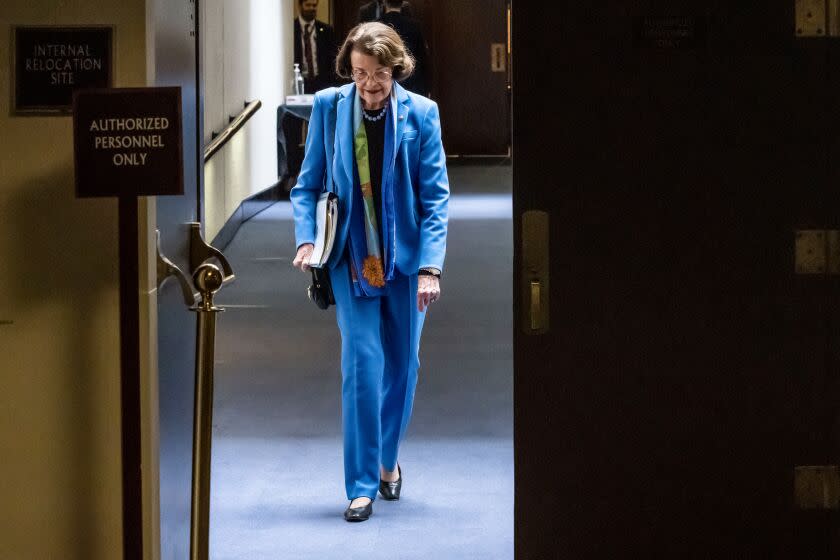Nicholas Goldberg: The Dianne Feinstein I knew

- Oops!Something went wrong.Please try again later.
I used to visit Sen. Dianne Feinstein every year when I went to Washington. It’s always a thrill, even now that I’m in my 60s, to enter a U.S. senator’s office. It’s partly the super-tall windows and the heavy doors. Feinstein worked on the third floor of the Hart Senate Office Building, across the street from the Capitol.
On Tuesday, she announced that she won’t run again in 2024, that at age 89 — the oldest member of the Senate, where she’s served for 30 years — she has decided to finish her term and be done with it.
The end of the Feinstein era couldn't help but bring back memories of my meetings with her over the years when I was The Times' editorial page editor. Inevitably, I’d be ushered in and we’d sit at the round coffee table in the center of her office, and just as inevitably, she’d offer me a glass of wine, even though it was generally 3 or 4 in the afternoon. She always seemed both surprised and a little disappointed when I said no.
Sometimes it was just us, but more often there were one or two aides in the room. Delegations would be waiting outside, and there were meetings to get to and phone calls to return, but I never felt rushed.
On several occasions she had a little lapdog with her — I can’t remember the breed — and periodically, if it appeared to be causing trouble, she’d pick it up and hold it.
She was already about 80 by the time I started making these visits. So in a sense it was like visiting your grandmother — but only if your grandmother was also an expert on arcane matters of California water policy and deeply steeped in the gory details of CIA torture. And if your grandmother had a lot of assistants bustling around to do her bidding and get her stuff.
Feinstein always had a complaint or two to make about our editorials in the L.A. Times, especially on water-related issues. That was how she opened most of our meetings. I struggled to keep up with her level of detail.
When we talked about CIA torture after she released the Senate Select Committee on Intelligence's devastating report on "detention and interrogation," she danced easily between what was unclassified and what she couldn’t tell me because it was still secret. Her outrage at the behavior of the CIA then was obvious and heartfelt.
She was tough, no-nonsense and could occasionally be tetchy. A television was sometimes on in the background; once, when news was breaking, she made me watch President Trump on CNN with her for almost half an hour during my allotted meeting time, then rushed out for an unexpected floor vote in her jacket and pearls, leaving me unable to ask her a thing. Her aides shrugged. That’s the way it went.
Our meetings were held on background, so I won’t quote her. But I can report that she wasn't averse to a little off-the-record political gossip.
The word from my progressive friends was that Feinstein wasn’t sufficiently liberal or enough of a firebrand. But I appreciated her sense of decorum.
She was consistently who she was — a throwback to an earlier, more genteel era, one where Democrats and Republicans could fight all day and have dinner together at night, where opponents at least occasionally reached across the aisles and sought bipartisan deals. She seemed surprised and saddened by the bitter partisanship of today's politics.
I wasn’t at all surprised when she got in trouble with her fellow Democrats for hugging and congratulating Sen. Lindsay Graham (R-S.C.) after the confirmation hearings of Supreme Court nominee (and now justice) Amy Coney Barrett. She was accused in recent years of being insufficiently partisan and aggressive in fighting Republicans.
That, as much as any sign of cognitive decline, was what made you feel she was a senator whose time had come and gone.
Still, she was unquestionably slowing down by the last time I saw her. She was more reliant on aides for information and reminders than she had been. They had to correct her a few times. There was a bit of discombobulation. And that was pre-pandemic, so it was several years ago.
Even before her 2018 reelection race, I found myself wishing she would step down rather than run again, for her own sake. Last year, just a week after her 89th birthday, I wrote a column describing her age as “a problem.” Not her age, per se, but the fact that her aides and colleagues were whispering about “rapid deterioration” and increasing “befuddlement.”
I didn't hear a word from her or her office.
On Tuesday, the New York Times reported that she now struggles to recall colleagues’ names and often has little recollection of meetings or phone conversations.
I’m glad she’s made the obviously correct decision not to run again.
She can look back with pride on an admirable career, including her work on gun control. Her commitment to that issue was forged in part by her experience in San Francisco when she was the person who found the body of Supervisor Harvey Milk after he was assassinated in 1978.
She can also be proud of her work investigating the CIA torture program. I still have the copy of the report she signed for me: “To Nick Goldberg, ‘Never Again.’ Dianne Feinstein.” It’s a remarkable piece of work about a shameful moment in U.S. history.
And she's done much more over 30 years in the Senate: helping to create Joshua Tree National Park, passing early legislation to fight climate change and working to mitigate the effects of drought.
The senator deserves to go out with her honor and dignity intact. And with our thanks.
This story originally appeared in Los Angeles Times.

